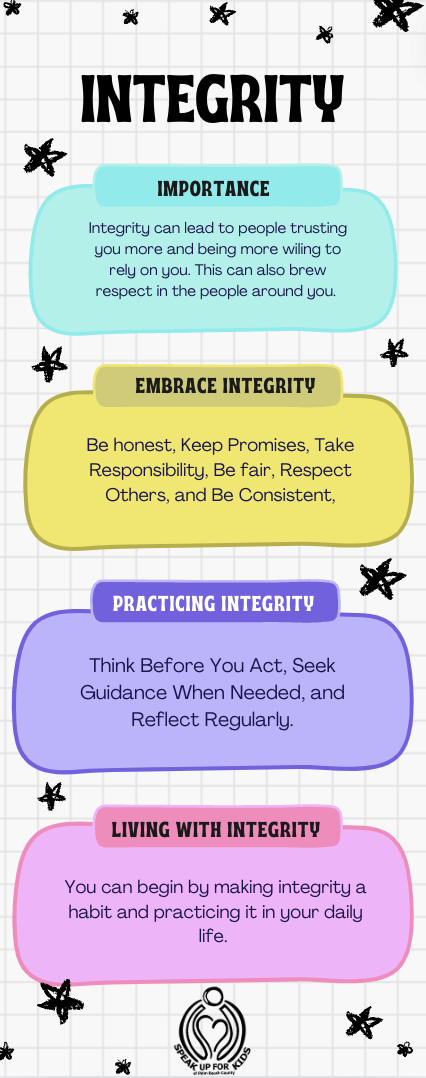Integrity
Contributed by Speak Up for Kids Student Intern Team — This article was developed through the combined efforts of multiple student interns, each bringing unique skills and perspectives to support life skills education for foster youth.
Overview
Integrity is the quality of being honest and having strong moral principles. It involves doing the right thing, even when no one is watching, and consistently aligning your actions with your values. Maintaining integrity is crucial for building trust, respect, and a positive reputation. Here’s a guide on how to cultivate and uphold integrity in your life.
Steps:
Understand the Importance of Integrity:
Define Integrity: Reflect on what integrity means to you. It includes honesty, accountability, fairness, and consistency.
Value Alignment: Recognize how integrity aligns with your core values and the positive impact it has on your life and relationships.
Self-Reflection and Awareness:
Identify Core Values: Determine your core values and principles. These will guide your actions and decisions.
Reflect on Actions: Regularly reflect on your actions and decisions to ensure they align with your values.
Commit to Honesty:
Truthfulness: Make a commitment to be honest in all your dealings. Avoid lying, cheating, or misleading others.
Transparency: Be transparent in your actions and communications. Share information openly and honestly.
Be Accountable:
Take Responsibility: Own up to your mistakes and take responsibility for your actions. Avoid shifting blame onto others.
Make Amends: If you make a mistake, take steps to rectify it and make amends where possible.
Consistency in Actions:
Align Words and Actions: Ensure that your actions consistently match your words. Avoid hypocrisy and double standards.
Follow Through: Follow through on your commitments and promises. Reliability builds trust and respect.
Practice Fairness and Respect:
Treat Others Fairly: Treat everyone with fairness and respect, regardless of their status or position.
Listen and Empathize: Listen to others’ perspectives and show empathy. Consider how your actions affect others.
Set Boundaries:
Define Limits: Set clear boundaries for what you will and will not do. Stick to these boundaries even under pressure.
Stand Firm: Stand firm in your principles, even when faced with challenges or temptations to compromise.
Seek Feedback and Improvement:
Ask for Feedback: Seek feedback from trusted friends, colleagues, or mentors about your behavior and actions.
Continuous Improvement: Continuously strive to improve your character and integrity through self-awareness and learning.
Key Questions:
What Are My Core Values?
What values and principles are most important to me?
How do these values guide my actions and decisions?
How Honest Am I in My Daily Life?
Do I consistently tell the truth and avoid misleading others?
How can I be more transparent in my communications and actions?
How Do I Handle Mistakes?
Do I take responsibility for my mistakes and make amends?
How can I avoid shifting blame and practice accountability?
Are My Actions Consistent with My Words?
Do my actions align with what I say and promise?
How can I ensure I follow through on my commitments?
How Fair and Respectful Am I?
Do I treat everyone with fairness and respect, regardless of their status?
How can I listen to and empathize with others better?
What Boundaries Have I Set?
What are my limits for acceptable behavior, and do I stick to them?
How can I stand firm in my principles under pressure?
How Can I Improve My Integrity?
What feedback have I received about my integrity, and how can I use it to improve?
What steps can I take to continuously develop my character and integrity?
Tips:
Lead by Example: Be a role model for others by demonstrating integrity in your actions and decisions.
Stay Humble: Acknowledge your imperfections and strive to improve continuously.
Avoid Temptations: Be aware of situations that may tempt you to compromise your integrity and have strategies to avoid them.
Practice Gratitude: Regularly reflect on and appreciate the positive impact of integrity on your life and relationships.
Final Thoughts
By following these steps and considering these questions, you can cultivate and uphold integrity in your life. Integrity is a cornerstone of character and trustworthiness, and maintaining it is essential for personal and professional success.


